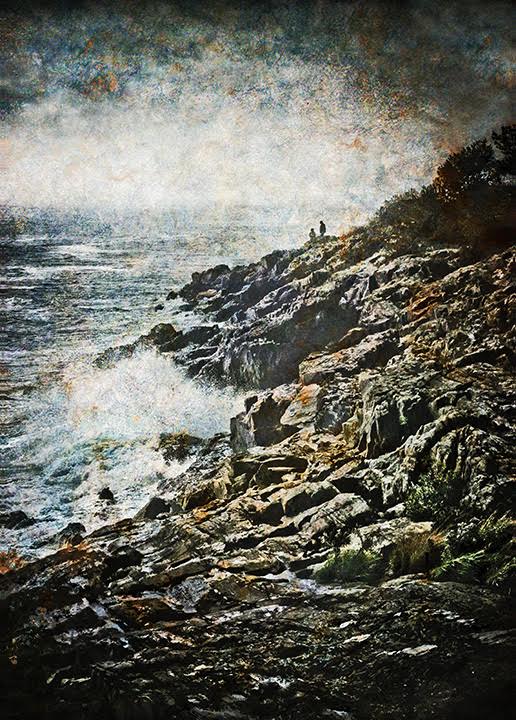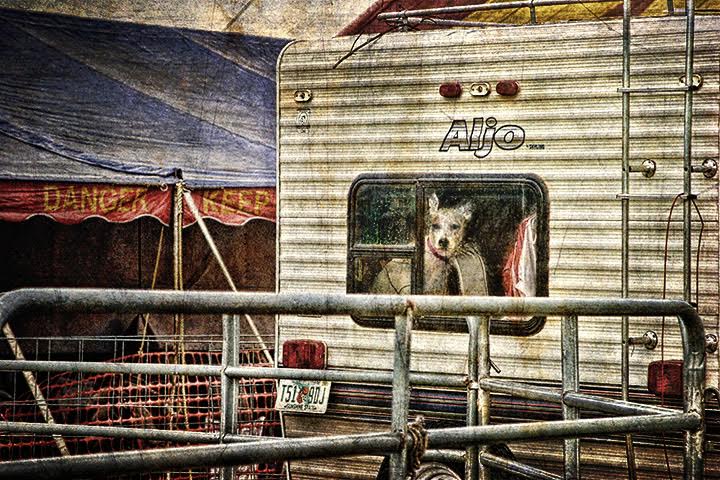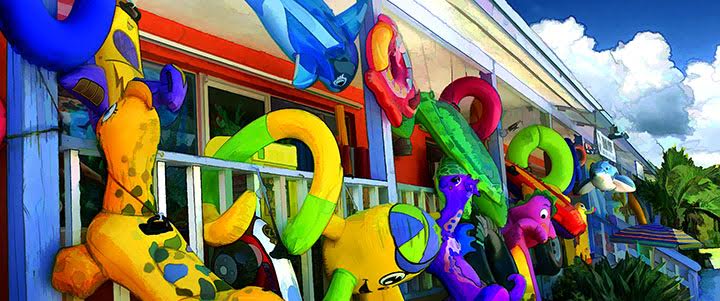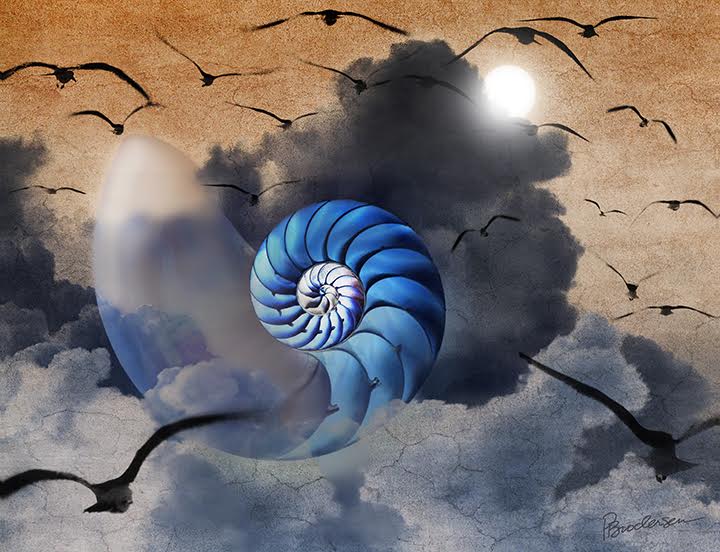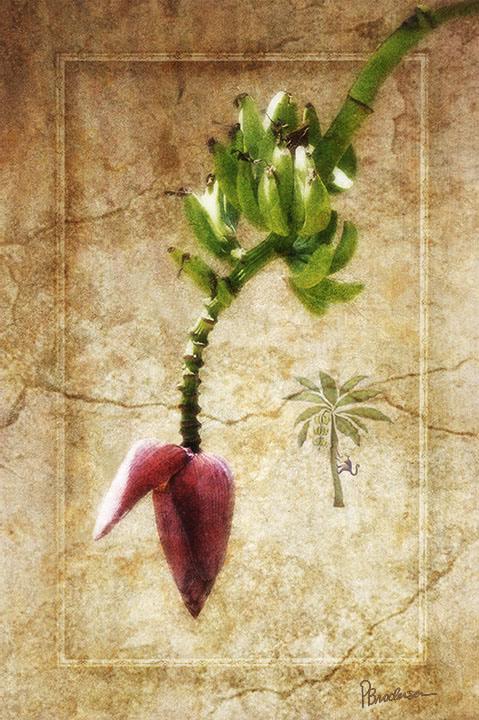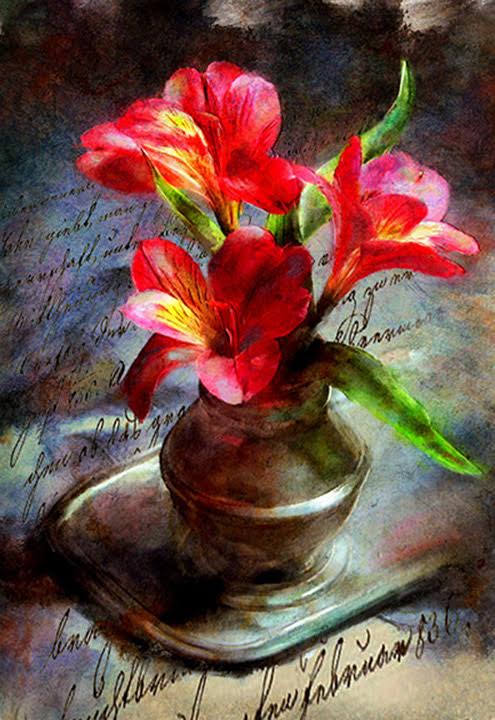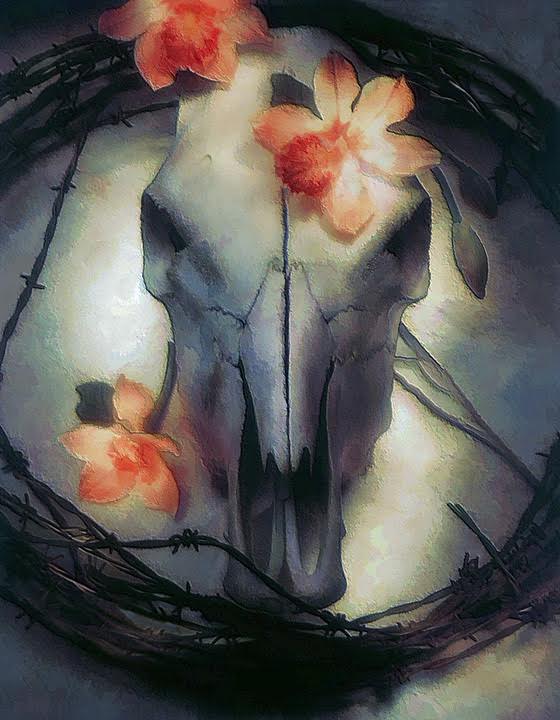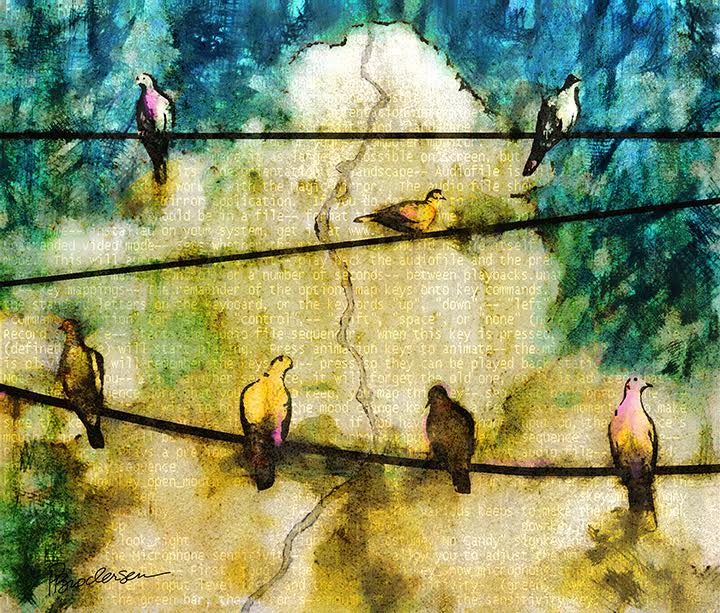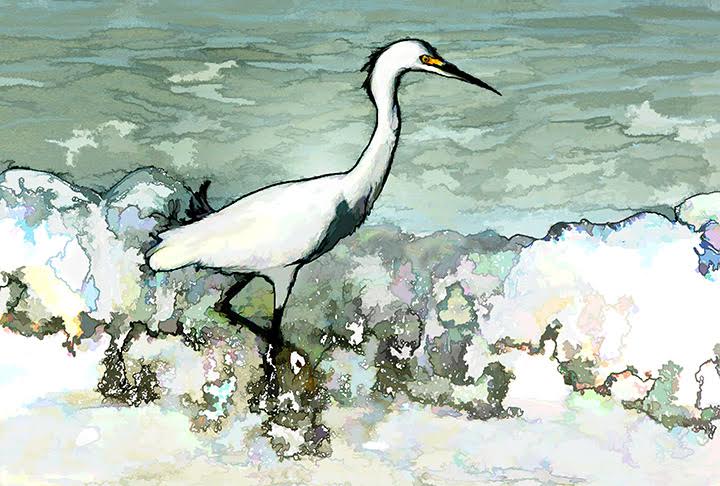
“Sanibel Surf” by Pam Brodersen
1
March 7, 2008
Last night’s shower has soaked the low-lying roads and swampy ground of the St. Bernard Cemetery in southeast New Orleans. I’ve driven from a work site on a street called Tiffany Court, past an overgrown marsh and a white heron posed in ankle deep water, and have paused at the edge of this damp cemetery. The heavy iron gate shines black from the steady drizzle, the angel perched on the post glaring down with misted eyes. Rain spots my windshield, spills down it. My phone buzzes, and my brother’s name pops onto the screen.
“I was playing with my phone,” Edwin says when I answer. “I wanted to see if I could get you and Ellen on a conference call.”
To find him playing with his phone on a rainy Thursday morning is not surprising or out of character. “Sure,” I say, cutting the engine. “Go ahead.”
I’m here in the St. Bernard parish with a group of 12 college students and my husband Bill, all of us volunteers in the Alternative Spring Break program sponsored by Habitat for Humanity, building houses to replace those washed out in the floods following Hurricane Katrina. We work all day then spend our nights in an elementary school building used as temporary housing for volunteers, a place now called Camp Hope. Our quarters are bunk beds built from 2 x 4s in what were once classrooms where first and second graders learned to count and spell. Over 400 college students—and just a few adults like me—share this cramped space. Rain has poured down almost every day, mocking our generosity.
This morning, for the fourth straight day, our group was assigned the chore of hammering siding onto a new house drenched by last night’s downpour. Our AmeriCorps leader said something like, “The need for housing doesn’t stop with rain, so we don’t stop either.” Our student leader, a mature young woman named Katie, said to us all, “Don’t work if you don’t feel good about it.”
I pictured broken ankles from ladder falls, lingering coughs and colds and didn’t feel good about working, so I got in the rental car and took off, taking rights, lefts, heading down roads I’d never seen before, and finally pulling into this gravel lot of the St. Bernard Parish Catholic Cemetery. It’s the oldest cemetery still in use in the state of Louisiana, its heavy mausoleums recording some of the earliest names of the Isleños, descendants of colonists from the Canary Islands, beginning in 1767. Many stones are hand-carved, and all are decorated with statuettes of saints or angels, flowers, flags, or crosses, inscriptions, and shadow boxes.
Hurricane Katrina did little damage to the cemetery, other than washing a few sheds and boats through its gates. On this day, its paths are puddled with water that poured down in relentless waves last night.
Edwin puts me on hold while he tries to reach our sister, Ellen. I watch the rivers of rain pirouette across my windshield and wait. In a few minutes, he’s back. “She’s not answering. But I’ve got her voice mail, so we can both leave her a message.”
He goes first, explaining to my sister the missed opportunity to talk to both of us at the same time. Then me: “Hey, Ellen. I’m in New Orleans, sitting here in the pouring down rain. I’m sorry we missed you. I’ll see you Saturday.”
“Okay, that’s it,” Edwin says. “I’ve got a lunch meeting. I need to go. You all right?”
“Tired, smelly, sleepy, and ready to come home, but otherwise, I’m fine.”
Then I remember: it’s March 7, a day that has set me off-kilter for the last 39 years.
2
March 7, 1969
My mother sits upright on the pillow end of my sister’s extra twin bed, the one that had been mine until I moved into my own room just four years earlier. The light from the nightstand casts a flat yellow beam. We three children gather on both beds around her, Edwin perched directly across from her on my sister’s bed, and Ellen and I awkwardly facing each other on the ends, our shoulders curved downward, already tired, already our burden too much for children our age, already our age much older than it was a few days earlier.
Our father has died. After what was supposed to be minor surgery to repair an ulcerated stomach, he has had a heart attack, and just like that, he’s gone.
At last the house is empty of friends, relatives, and neighbors, sometimes wanted and sometimes not. In a few days, my brother will be heading back to his dormitory at Clemson University. On Monday, my sister and I will go back to school. What would we do otherwise but sit around the house and feel sorry for ourselves? Feeling sorry for ourselves will do us no good. Missing school on Monday would only postpone the difficult return, and throw us behind in important things like algebra or the study of American government.
Outside, unrelenting rain pelts down, pounding on the roof, slicing against window panes. Inside, there are no tears. My mother’s long fingers trace the stitching on my sister’s blue bedspread. I don’t have to touch her hands to know they are cold.
“We will go on with our lives,” she says. “We will go back to school, back to work. Staying home won’t make it any better.”
“Edwin is now the man of the house,” she continues. “Ellen and Barbara, you will help me take care of things. Life will be different but we will be strong. We will not talk about this. We will move on.”
We will not talk about this. We will not call his name. There will be no laughter, there will be no joy. We will be strong, and we will make it.
That night I take the small knot of grief that is beginning to work its way from my gut to my throat and swallow it back down. The tears that flowed only one time in four days, one late afternoon behind my closed bedroom door, seep back into the impenetrable foundation my mother has laid. They will not find their way out again.
3
March 7, 2008
After dinner in the Camp Hope cafeteria, I wait in line in the community room so I can check my email before falling into bed. We are leaving in the morning, spending our last couple of hours at the worksite before piling into our three vehicles and heading to the airport in Biloxi, an hour’s drive. I’ve taken my last shower, stuffed my muddy clothes into plastic bags and crammed them into my suitcase.
Exhaustion defines the place this evening. It has been cold all week and rainy for half of it. The warm fuzzy feeling of our decision to come here for spring break has numbed beneath the cramped conditions and bad food. We’ll get it back, of course, but not one of our crew is sad to be leaving.
Computers line one wall of the community room, where two soft couches, a few tables for board games, and a TV mounted in a corner provide the best hang-out space of the school.
I log on and type in my password to retrieve incoming mail. There is only one, from my brother, to both me and my sister. The subject heading is left blank. I double-click, and the message opens.
Dear Sisters, I tried to get the three of us on a three-way call today because I was in a deep moment of reflection. Every year since 1969, I and presumably you, relive at some point the biggest turning point of our lives. Since then, of course, other days bring about similar emotions. . . but the events of 1969 cannot escape me as the single most defining moment of my entire life.
I read these words and the story that follows with fear and fascination. It is an hour by hour account of his life over a two day period that begins, I will never forget the dorm phone call I got from Mama on that Thursday at 6 a.m. telling me I needed to come home. . . . hitchhiking to an uncertain destiny, 250 miles that took nearly eight hours to accomplish, not realizing I was heading into a lifetime of questions, literally a lifetime of lessons. He’d spend the next 15 hours waiting by my father’s hospital bedside and the next 40 years never forgetting those hours.
His story is remarkable because I’ve never heard it. It is perhaps more remarkable that I’ve never heard it. It confesses to a truth I have felt all my life but have rarely owned up to: an addiction to loss, an inability to move beyond that single day that comes relentlessly, year after year after year.
4
March 7, 1994
I live in Lexington, Kentucky, in a small, rented house with my husband Bill, who has left the newspaper business after a successful fifteen-year career and entered graduate school. Our son Will is 8. He’s a happy, rambunctious child with a creative imagination and a love for his red cat that will carry him through to adulthood. We’ve been in this town now for four years, without any family nearby but surrounded by good friends and neighbors. I love Kentucky, love myself in Kentucky. I’ve found the seeds of a poet buried inside me, and they’re sprouting and beginning to leaf out in my words on the page and the breaths of my life, my eyes focused outward on the vibrant color of the world around me.
It’s a cold morning, the remnants of an earlier week’s snow still lingering. Bill has walked to campus, and Will is home from school and is in the living room with his friends Dillon and Ryan, where they’ve turned chairs and couches on their sides and covered them with blankets to build a fort. Something luscious and economical, like a chicken or stew beef on sale, is simmering in the crock pot on the kitchen counter, and I’m stuffing clothes into the washing machine by the back door.
The phone jingles, and jingles again before I pick up. It’s my mother in North Carolina.
“What are you doing?” she asks in her now delicate, soft-pitched voice. She has remarried, is happy, her life warm and full. Still, I’m surprised to hear from her in the middle of the day during the work week. We chat oddly for a minute or two, and I answer her questions about what the rest of the family is up to, how I’m spending my day.
Then after a pause, she says, “I just wondered if you know what day it is.”
I freeze, tensing from head to toe as though a muscle spasm has claimed my entire body. I’ve always known this day, each year its spinning and darkening into a shape unlike any other in the year, never what I expect and never one I can avoid. “Yes, I know,” is all I can say.
There’s another pause, and then, as though she’s been practicing, she continues, “It’s been twenty-five years. I just wanted to know if you’re all right.”
It’s the question I’ve wanted her to ask, wanted anybody to ask, but if there’s an answer for it, I buried it deep twenty-five years ago, just like she taught me to. Part of me wants to take this moment and tell her everything, to let it spill through the phone line to the other side of the mountain and into her house. I want to let it out, but it’s tamped down too well.
“I’m fine,” I answer.
I’m not fine, of course. I’ve simply moved and moving keeps it from coming up, keeps it out of my face, takes away the daily reminders, the people, the weather, the buildings, the names, the words I cannot say and have never been able to say.
There’s little more to our conversation. A quick change of subject, a few more niceties, and we hang up. When I put the receiver back into the cradle, my hand is shaking.
A year will pass before I relocate, kicking and screaming, back to North Carolina, where my choice becomes either to open the Pandora’s box of anger, sadness, untold stories, and unspoken words long buried, or let the poison of denial finish its job of eating away my insides.
My mother will live five more years. She won’t ask about it again.
5
March 8, 2008
Ellen picks us up at the airport upon our return from New Orleans. Rain still teases around the edges of morning, soft patters against her windshield. After a quick rundown of trip details, I ask, ““So, did you get Edwin’s email?”
“I did,” she says. We are pulling into her driveway now, late afternoon’s overhang of winter chilling the March afternoon.
“So, what’s going on with him?” I ask. “And what are you going to do?”
As middle sister, she never makes up her mind about anything until she weighs all possibilities, checks the lows and highs of everyone’s temperature, and then finds common ground.
“I guess I’m going to answer,” she says.
Tomorrow morning, I will open my email to Ellen’s response, a remarkable account of faith and friends that saw her through the days that followed. Her story will fill four pages. We are survivors with a variety of survival techniques, she will conclude.
But tonight, it’s my turn. That night, after unpacking my suitcase and getting a load of smelly clothes in the wash, I sit down at my computer and reread my brother’s words, the tender story of a boy turned man in a single weekend. I begin my story:
What I remember is him in the bathroom, sick every morning. I tell my version of the day of our father’s death, my grandfather waking Ellen and me at 6 a.m., that day’s rain beginning in fog and unceasing through the long weekend, the long grief within the dark house that followed. Had he lived 39 more years—or even 29 or even 19—how very different our lives would have been. I write for an hour or more, lost in years, before I hit “Send” then close my screen and stand from my chair, stretching my arms behind my back.
I don’t yet know what the months and years ahead will mean. I don’t yet know that beginning to tell our stories will open into volumes of words spilling onto pages, lengthy phone calls, time spent together, the three of us, doing the work of grief that’s 39 years old. What I do know is that something larger and stronger than me has budged, and soon I will—and I’ll mean it this time—be fine.
I pull back the window blinds enough to see the gibbous moon, the face, always in it, still there.
Barbara Presnell is an essayist and poet who lives in North Carolina. Her latest poetry book, Blue Star, traces her family’s involvement in war from the Civil War to the present through military records, census reports, letters, journals, and photographs. Her book, Piece Work, won the Cleveland State University Poetry Center’s First Book Prize. She has published work in Cumberland River Review, The Southern Review, Malahat Review, Appalachian Journal, Chariton Review, and other journals and anthologies. She has received grant and residency support from the North Carolina Arts Council, the Kentucky Arts Council, Soapstone, Inc., and Willapa Bay AiR.


